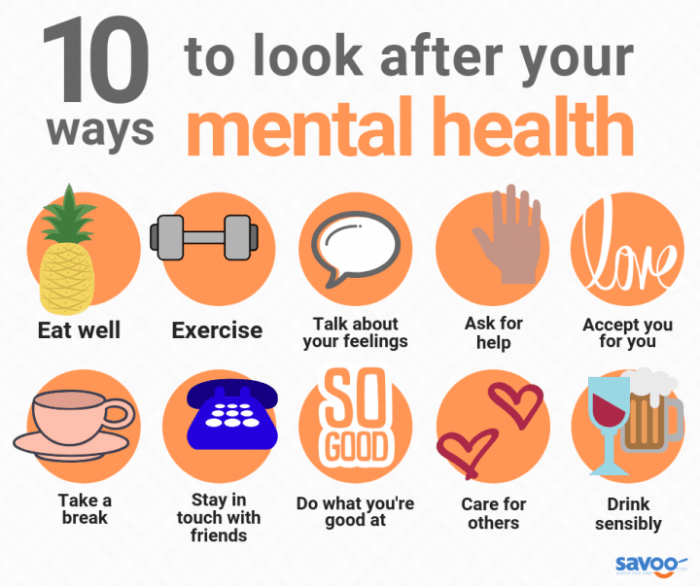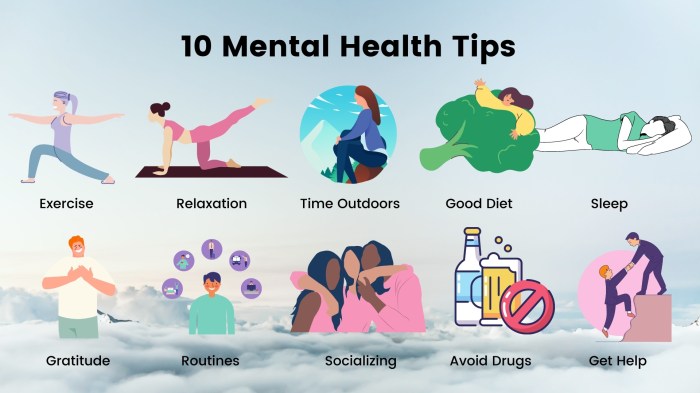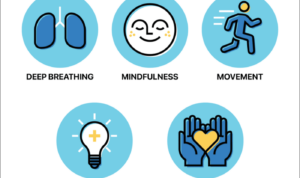Mental Wellness Tips sets the stage for this enthralling narrative, offering readers a glimpse into a story that is rich in detail with american high school hip style and brimming with originality from the outset.
In today’s fast-paced world, taking care of our mental well-being is more important than ever. This guide will explore the significance of mental wellness, provide practical tips for enhancing it, and discuss the importance of creating a supportive environment and practicing self-care.
Importance of Mental Wellness

Mental wellness is crucial for overall well-being as it encompasses our emotional, psychological, and social well-being. It affects how we think, feel, and act, ultimately impacting how we handle stress, relate to others, and make choices in our daily lives.
Impact on Daily Life and Productivity
Maintaining good mental wellness is essential for daily functioning and productivity. When our mental health is in check, we are better equipped to handle challenges, make sound decisions, and maintain healthy relationships.
- Engaging in regular physical activity can help boost mood and reduce feelings of anxiety and depression.
- Practicing mindfulness and meditation techniques can improve focus, reduce stress, and enhance overall well-being.
- Seeking support from friends, family, or mental health professionals can provide valuable resources and guidance in times of need.
Tips for Enhancing Mental Wellness
Maintaining good mental health is crucial for overall well-being. Here are some effective strategies to enhance your mental wellness:
Managing Stress Effectively
Stress is a common factor that can negatively impact mental health. To manage stress effectively, it is essential to identify stressors and develop healthy coping mechanisms. Some tips include:
- Practice deep breathing exercises
- Engage in regular physical activity
- Set boundaries and prioritize tasks
- Seek support from friends, family, or a therapist
Importance of Regular Exercise
Regular exercise not only benefits physical health but also plays a significant role in improving mental well-being. Exercise releases endorphins, which are known as “feel-good” hormones. Incorporating physical activity into your routine can:
- Reduce symptoms of anxiety and depression
- Improve sleep quality
- Boost self-esteem and confidence
- Provide a healthy outlet for stress
Practicing Mindfulness and Meditation
Mindfulness and meditation are powerful tools for promoting mental wellness. These practices help in grounding yourself in the present moment and cultivating a sense of calm. Tips for incorporating mindfulness and meditation into your daily life include:
- Start with short meditation sessions
- Practice mindful breathing exercises throughout the day
- Engage in activities mindfully, focusing on the present moment
- Use guided meditation apps or videos for support
Creating a Supportive Environment: Mental Wellness Tips
Creating a supportive environment is crucial for maintaining good mental wellness. Surrounding yourself with a network of caring and positive individuals can have a significant impact on your overall well-being.
Importance of Healthy Relationships
Cultivating healthy relationships is essential for better mental wellness. Positive relationships can provide emotional support, encouragement, and a sense of belonging, all of which contribute to a healthier mindset and improved mental health.
- Communicate openly and honestly with your loved ones.
- Offer support and encouragement to others in your network.
- Choose relationships that are mutually beneficial and uplifting.
Setting Boundaries, Mental Wellness Tips
Setting boundaries is key to protecting your mental well-being. It’s important to establish limits in your relationships and interactions to prevent feelings of overwhelm or burnout.
- Learn to say no when necessary to avoid taking on too much.
- Communicate your needs and expectations clearly to others.
- Take breaks and prioritize self-care to maintain a healthy balance.
Self-Care Practices

Taking care of yourself is crucial for maintaining good mental health. It involves engaging in activities that promote relaxation, reduce stress, and boost overall well-being.
Examples of Self-Care Activities:
- Practicing mindfulness and meditation
- Exercising regularly
- Getting enough sleep
- Engaging in hobbies or activities you enjoy
- Spending time with loved ones
- Setting boundaries and saying no when needed
Importance of Prioritizing Self-Care:
Self-care is not selfish; it is essential for maintaining mental health. By taking care of yourself, you are better able to handle stress, improve your mood, and prevent burnout.
Tips for Creating a Self-Care Routine:
- Identify activities that make you feel good and incorporate them into your daily or weekly schedule.
- Set aside dedicated time for self-care, treating it as a non-negotiable part of your routine.
- Experiment with different self-care practices to find what works best for you.
- Practice self-compassion and avoid feeling guilty for taking time for yourself.
- Stay consistent with your self-care routine, even when life gets busy.
